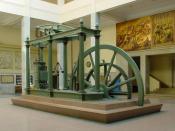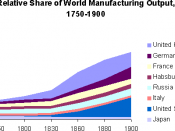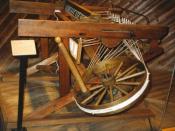The industrial revolution was a great time of change for mankind; it was a great advancement in civilization. Not only did the economy rise, and the domestic life modernized, but the role of women in society leaped forward. The British women of pre 1750 lived humble lives, with small purposes outside the home. This would all change with the industrial boom in Britain, for mass numbers of British women left their homes, and show their worth by working along side with their men in brutal factories. The accomplishments in the factories eventually led to the women suffrage movement around the world. Womanhood took a giant step towards a daring path into improvement and recognition, and never looked back. Britain's industrial revolution would set the women role changes for the era of 1850-1920 with the British women getting a sense of purpose in society and independence in their needed labor for the economy; they have long gone left the simple domestic life of the pre1750's.
Throughout history, women all around the world had been burden with a status extremely inferior to the men. Before the 1750's British women strictly held the traditional roles, like other women anywhere else. No matter what class they belonged in, British women all had the same basic traditional role of a wife doing the domestic works; cooking, cleaning, caring for the children, fetching water, making and mending, and leaving all major decisions to the man of the house. Very few places employed female workers besides family business and farm works. If women worked domestically for other homes, she would work about 15 hours a day. A washer lady worked about 20 hours a day, but got three times as much as a domestic servant[Dalstorm pg. 27]. Women were virtually slaves, caring and efficiently fulfilling their obligations.


